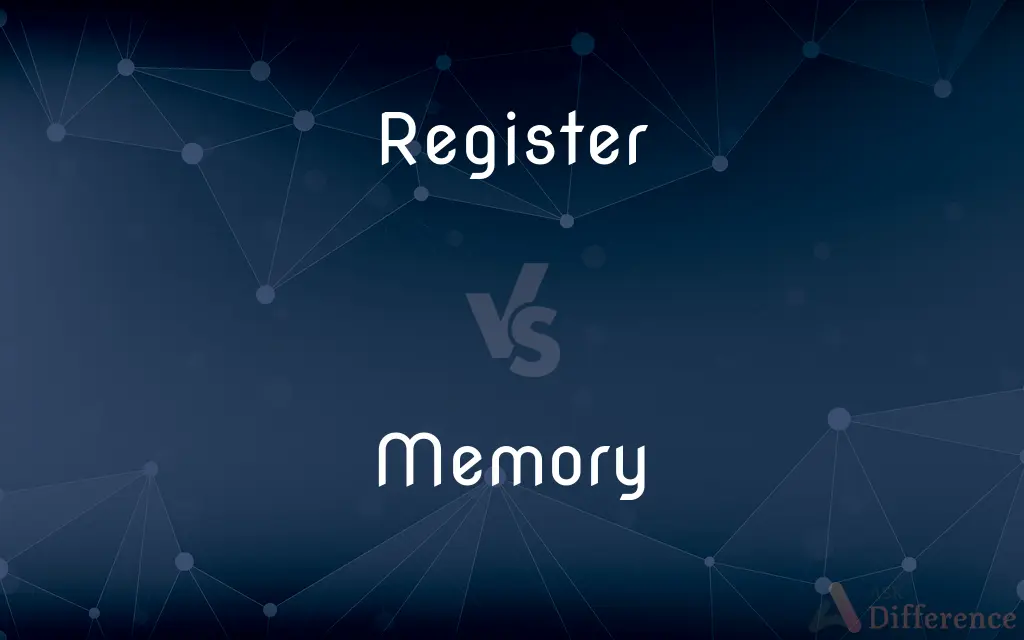Register vs. Memory — What's the Difference?
By Tayyaba Rehman — Published on January 15, 2024
Register is a small, fast storage location within the CPU for immediate data processing. Memory is a larger, slower storage used for holding data and programs.

Difference Between Register and Memory
Table of Contents
ADVERTISEMENT
Key Differences
Registers in a computer are small, very fast storage locations directly inside the CPU. They hold data that the CPU is currently processing. Memory, often referred to as RAM (Random Access Memory), is a larger storage space used to store data and programs while the computer is running. It's not as fast as registers but has much more capacity.
Registers are crucial for the CPU's operations, as they allow for quick access and manipulation of data. They are used to hold intermediate results and special instructions. Memory serves as a space for the computer to read from and write to during operation, holding data that is not being immediately processed but will be needed soon.
The speed of registers is essential for the computer’s performance, as they work directly with the CPU at the fastest speed possible. However, their size is very limited compared to memory. Memory, while slower, provides the necessary space to run applications and manage data during processing.
Registers operate at the speed of the CPU, making them the fastest form of storage in a computer. They are used for specific, immediate tasks. Memory is slower but is crucial for multitasking and running complex programs, as it can hold a large amount of data that is readily accessible by the CPU.
In terms of hierarchy, registers are at the top, being the first storage point in the data processing cycle. Memory sits below them in the hierarchy, acting as a bridge between the fast processing of the CPU and the slower, permanent storage of a hard drive.
ADVERTISEMENT
Comparison Chart
Speed
Very fast, operates at CPU speed
Slower than registers, faster than storage
Storage Capacity
Very limited, holds only immediate data
Larger, holds programs and data
Function
Holds data for immediate CPU processing
Stores data for short-term access
Access Time
Extremely fast
Slower than registers, but fast
Location
Inside the CPU
Separate from CPU, connected via bus
Compare with Definitions
Register
A small, fast storage area within the CPU.
The CPU register temporarily holds data for rapid calculation.
Memory
Storage for data and programs during operation.
The computer's memory stores the operating system and active applications.
Register
Used for immediate processing of data.
Registers store operands for the CPU’s current operations.
Memory
Enables multitasking and complex computations.
With ample memory, the computer can run multiple programs simultaneously.
Register
Essential for the CPU's operation speed.
Registers contribute to the CPU's efficiency by providing quick data access.
Memory
Larger and slower than registers.
Memory, while slower than registers, can hold much more data.
Register
Holds instructions and processing results.
The arithmetic results are stored in a CPU register.
Memory
Temporarily holds data for CPU access.
Data from memory is fetched by the CPU for processing.
Register
Limited in number and size.
Due to their limited size, registers can only hold small amounts of data.
Memory
Bridge between CPU processing and long-term storage.
Memory serves as an intermediary storage between the CPU and the hard drive.
Register
(Computers) A part of the central processing unit used as a storage location.
Memory
(computing) The part of a computer that stores variable executable code or data (RAM) or unalterable executable code or default data (ROM).
This data passes from the CPU to the memory.
Register
(computing) A small unit of very fast memory that is directly accessible to the central processing unit, and is mostly used to store inputs, outputs, or intermediate results of computations.
Register
(computer science) memory device that is the part of computer memory that has a specific address and that is used to hold information of a specific kind
Common Curiosities
What is the main role of a register in a CPU?
A register temporarily holds data that the CPU is currently processing.
Why are registers faster than memory?
Registers are faster because they are located within the CPU and have direct access to its processing power.
Can memory affect a computer's performance?
Yes, the amount and speed of memory can significantly impact a computer's performance, especially in multitasking.
How many registers does a typical CPU have?
The number of registers varies by CPU design, but they are generally limited in number.
What happens to data in memory when the computer is turned off?
Data in memory is lost when the computer is turned off, as RAM is volatile.
What is memory used for in a computer?
Memory is used to store data and programs that are in use while the computer is running.
Is memory the same as storage?
No, memory (RAM) is temporary storage for active data, while storage (like a hard drive) is for long-term data retention.
What is the significance of memory speed?
Memory speed affects how quickly the CPU can access data from it, impacting overall system performance.
Can you upgrade a computer's registers?
No, registers are an integral part of the CPU and cannot be upgraded.
Is the data in registers saved when a computer hibernates?
No, register data is not saved during hibernation; it's typically saved to long-term storage.
Does a computer with more memory need fewer registers?
No, the number of registers is independent of the amount of memory and is determined by the CPU architecture.
Do registers have different types?
Yes, there are different types of registers for specific functions, like data, address, and instruction registers.
How is data transferred between memory and the CPU?
Data is transferred via the computer's bus system from memory to the CPU and vice versa.
Are registers used for long-term data storage?
No, registers are only for short-term data storage needed for immediate processing.
Can increasing memory improve multitasking?
Yes, more memory allows a computer to handle more tasks at once without slowing down.
Share Your Discovery

Previous Comparison
Copper Oxychloride vs. Copper Sulphate
Next Comparison
Sodium Lauryl Sulfate vs. Sodium Lauroyl SarcosinateAuthor Spotlight
Written by
Tayyaba RehmanTayyaba Rehman is a distinguished writer, currently serving as a primary contributor to askdifference.com. As a researcher in semantics and etymology, Tayyaba's passion for the complexity of languages and their distinctions has found a perfect home on the platform. Tayyaba delves into the intricacies of language, distinguishing between commonly confused words and phrases, thereby providing clarity for readers worldwide.
















































